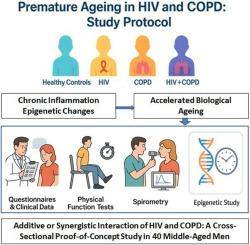Understanding the Interaction Between Premature Ageing in HIV and COPD Using Epigenetic Clocks: A Case–Control Study Protocol
Q4 Medicine
引用次数: 0
Abstract
Objectives
Our project aims to study premature ageing in people living with HIV and COPD. We hypothesize that the chronic inflammation associated with both conditions accelerates the ageing process. HIV infection has undergone a significant paradigm shift in recent years, transitioning from a rapidly fatal disease to a chronic condition. People living with HIV experience more comorbidities (cardiovascular events, osteoporosis, cancer, neurodegenerative diseases, …) at a younger age. This phenomenon, often referred to as ‘premature ageing,’ is associated with chronic inflammation and epigenetic changes. Epigenetic clocks, composite markers based on DNA methylation alterations, have emerged as valuable tools for predicting biological age as they predict mortality better than chronological age. These alterations are described both systemically and at the pulmonary level and are related to a higher prevalence of chronic obstructive pulmonary disease (COPD) and worsened respiratory function.
Material and methods
To achieve this, we will perform a case–control study analysing epigenetic clocks and comparing four different groups: healthy control subjects, patients living with HIV without COPD, COPD patients without HIV, and patients with both HIV and COPD.
Conclusions
We hypothesise that patients with both COPD and HIV will exceed the cumulative ageing effect of each condition separately, which suggests a multiplicative effect of ageing between HIV and COPD. Should our hypothesis be supported, it could justify a re-evaluation and potential modification of current screening protocols for COPD in HIV patients or the implementation of case-finding strategies.

利用表观遗传时钟了解HIV早衰与COPD之间的相互作用:一项病例对照研究方案
我们的项目旨在研究艾滋病毒和慢性阻塞性肺病患者的过早衰老。我们假设与这两种情况相关的慢性炎症加速了衰老过程。近年来,艾滋病毒感染经历了重大的模式转变,从一种迅速致命的疾病转变为一种慢性疾病。艾滋病毒感染者在更年轻的时候会经历更多的合并症(心血管事件、骨质疏松症、癌症、神经退行性疾病等)。这种现象通常被称为“早衰”,与慢性炎症和表观遗传变化有关。表观遗传时钟,基于DNA甲基化改变的复合标记,已经成为预测生物年龄的有价值的工具,因为它们比实足年龄更能预测死亡率。这些改变在系统和肺水平上都有描述,并且与慢性阻塞性肺疾病(COPD)的较高患病率和呼吸功能恶化有关。为了实现这一目标,我们将进行一项病例对照研究,分析表观遗传时钟,并比较四种不同的组:健康对照受试者、无COPD的HIV患者、无HIV的COPD患者和同时患有HIV和COPD的患者。结论我们假设同时患有COPD和HIV的患者将分别超过每种疾病的累积衰老效应,这表明HIV和COPD之间存在衰老的乘法效应。如果我们的假设得到支持,它可以证明重新评估和潜在修改当前HIV患者COPD筛查方案或实施病例发现策略是合理的。
本文章由计算机程序翻译,如有差异,请以英文原文为准。
求助全文
约1分钟内获得全文
求助全文
来源期刊

Open Respiratory Archives
Medicine-Pulmonary and Respiratory Medicine
CiteScore
1.10
自引率
0.00%
发文量
58
审稿时长
51 days
 求助内容:
求助内容: 应助结果提醒方式:
应助结果提醒方式:


